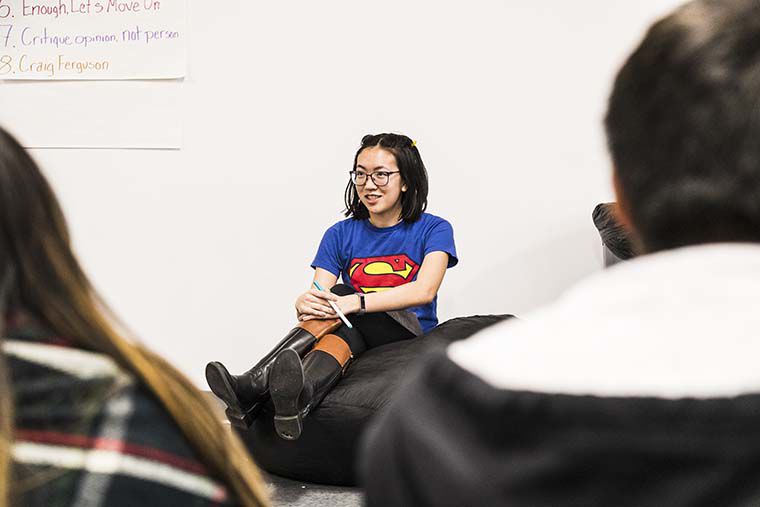Students tackle anti-blackness in Asian-American culture
February 21, 2019
Editor’s Note: The term “N-word” is used in this article, referring to a student’s personal experience discussed during an on-campus event. The Chronicle does not condone or promote the use of this term nor the word it refers to; however, the content of the article requires its use for clarity. The Chronicle warns of its use and apologizes for any discomfort the printing of this term may cause.
One Asian student’s mother tells her to lock the door when black people are around. Another Asian student is uncomfortable with his father’s use of the N-word. A black student’s Asian professor once called his sci-fi film idea, which had an all-black cast, “Wakanda in space.”
These were just some of the experiences brought to the Feb. 19 discussion about anti-blackness in the Asian-American community, hosted by the Asian Student Organization and the Black Student Union in the 618 S. Michigan Ave. Building.
“We’ve been conditioned to feel like we are being pit against each other,” junior graphic design major Jess Oh said. “You know you’re living in a bubble, but then you leave and actually see how much of a bubble it is.”
When defining what anti-blackness is, students shouted out terms such as racism, ignorance, stereotypes, misrepresentation and appropriation. Anti-blackness can include micro-aggressions, such as subconsciously not associating with black people, or macro-aggressions like using the N-word.
“One has to be [intentional] about doing something within the realm of anti-blackness,” said Khalid Long, visiting DEI scholar-in-residence for the Theatre Department. “That doesn‘t mean that we all haven’t been systemically ingrained to perform anti-blackness … but there is an intent by continuing to believe [those] notions.”
Junior musical theatre major Tori James said it was frustrating to have black culture appropriated and to have black people put down for their own culture.
Another aspect of anti-blackness is stereotyping. For example, the South Side is often considered “unsafe,” largely because of its predominantly black population, said International Student and Scholar Coordinator Kevin Obomanu.
Obomanu added he often gets asked by parents which parts of Chicago are safe. He tells them, as a queer black man, his version of safe is different from what theirs might be. For instance, he avoids areas with lots of bars, as drunk people may pose a threat to his safety.
Despite certain divides, ASO and BSU members expressed shared experiences, such as having considered whitening their skin, being the only person of color in one of their classes and, most commonly, not feeling “Asian enough” or “black enough.”
“I feel like I have to be a representative of my culture, but that’s a whole country, and I feel so under-qualified,” Oh said.
Long encouraged Oh and other members to break out of the mold of a certain culture and embrace themselves.
“It’s about resisting those demands and not allowing people to pigeonhole you into this rubric of what it is you have to do in order to claim this identity and what you cannot do so you won’t go outside the parameters they’ve set up,” Long said.
When it comes to tackling anti-blackness, attendees of the discussion said people should appreciate cultures rather than appropriate them, have a diverse group of friends, discuss difficult topics, educate oneself and others and recognize what privileges one may have that others do not.
“The greatest activists are those who are willing to lose something,” Long said. “Sometimes you’ve got to be willing to risk something.”


